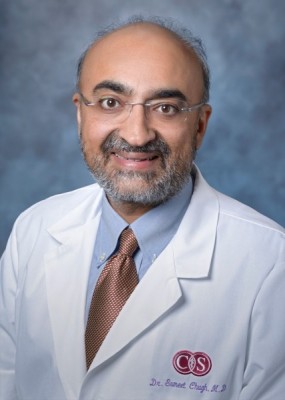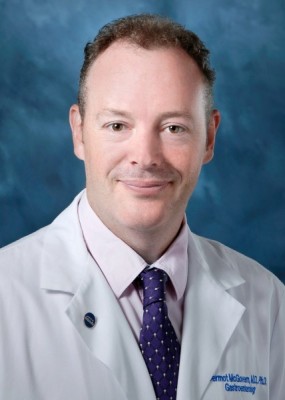Association of American Physicians Taps Cedars-Sinai Leader as President-Elect
Three Prominent Cedars-Sinai Physician-Scientists Also Inducted as Members of the Highly Respected Medical Organization
Physician-scientist Paul Noble, MD, chair of the Department of Medicine at Cedars-Sinai, was named president-elect of the Association of American Physicians (AAP) at the group's annual meeting in Chicago on April 22.
The AAP also inducted three Cedars-Sinai physicians—Nunzio Bottini, MD, PhD, Sumeet Chugh, MD, and Dermot McGovern, MD, PhD—who now join 17 other Cedars-Sinai faculty who are elected members of this prestigious academic society.
Dermot McGovern, MD, PhD—who now join 17 other Cedars-Sinai faculty who are elected members of this prestigious academic society.
The association, founded in the late 1800s, is an honorific, elected society of America's leading physician-scientists who exemplify the pinnacle of pioneering, enduring and impactful contributions to improve health.
“Election to the Association of American Physicians is reserved for just 70 individuals each year, marking a terrific achievement to have another three Cedars-Sinai physician-scientists selected,” said Shlomo Melmed, MB, ChB, executive vice president of Academic Affairs and dean of the Medical Faculty at Cedars-Sinai. “Our representation emphasizes the major contributions of these leaders, as well as the broad, reaching impact that our academic medical center has on the nation. Notably, we heartily congratulate Paul Noble on his elevation to president-elect.”
Noble, director of the Women's Guild Lung Institute and the Vera and Paul Guerin Family Distinguished Chair in Pulmonary Medicine, specializes in pulmonary fibrosis. In 2022, Noble was awarded $3.2 million from the National Institutes of Health for his research.
Noble’s term as president-elect begins May 1. He assumes the role of president of the AAP in May 2024.
“It has been a great honor to represent Cedars-Sinai on the AAP council and it is a privilege to be given this special opportunity of serving in a leadership role over the next two years,” said Noble. “This organization of physicians is dedicated to supporting scientific inquiry that leads to evidence-based therapies and diagnostic tools that are the foundation of improving the care and health of patients.”
 Bottini serves as the inaugural director of the Kao Autoimmunity Institute. His groundbreaking research focuses on the role of a group of proteins in the development of rheumatic diseases. His goal: to bring top investigators and clinicians together and leverage the scientific excellence and collaboration at Cedars-Sinai to develop novel, evidence-based and personalized treatments for systemic autoimmune diseases.
Bottini serves as the inaugural director of the Kao Autoimmunity Institute. His groundbreaking research focuses on the role of a group of proteins in the development of rheumatic diseases. His goal: to bring top investigators and clinicians together and leverage the scientific excellence and collaboration at Cedars-Sinai to develop novel, evidence-based and personalized treatments for systemic autoimmune diseases.
Chugh, associate director of the Smidt Heart Institute and director of the Division of Artificial Intelligence in Medicine, is a preeminent leader in the field of sudden cardiac arrest prevention. His team has discovered novel predictors of sudden cardiac arrest from an ongoing study of 1.8 million residents living in two separate U.S. communities.
million residents living in two separate U.S. communities.
McGovern, director of Translational Research in the Cedars-Sinai F. Widjaja Inflammatory Bowel Disease Institute and the Joshua L. and Lisa Z. Greer Chair in Inflammatory Bowel Disease Genetics, uses genetics and other big data approaches to study autoimmune and inflammatory bowel diseases in diverse populations. With an emphasis on clinical translation, McGovern continues to bring recent advances in genomics and other “-omic” capabilities directly to patients.
Read more from the Cedars-Sinai Blog: Lesson No. 2: Collaborate Strategically to Amplify Great Ideas




